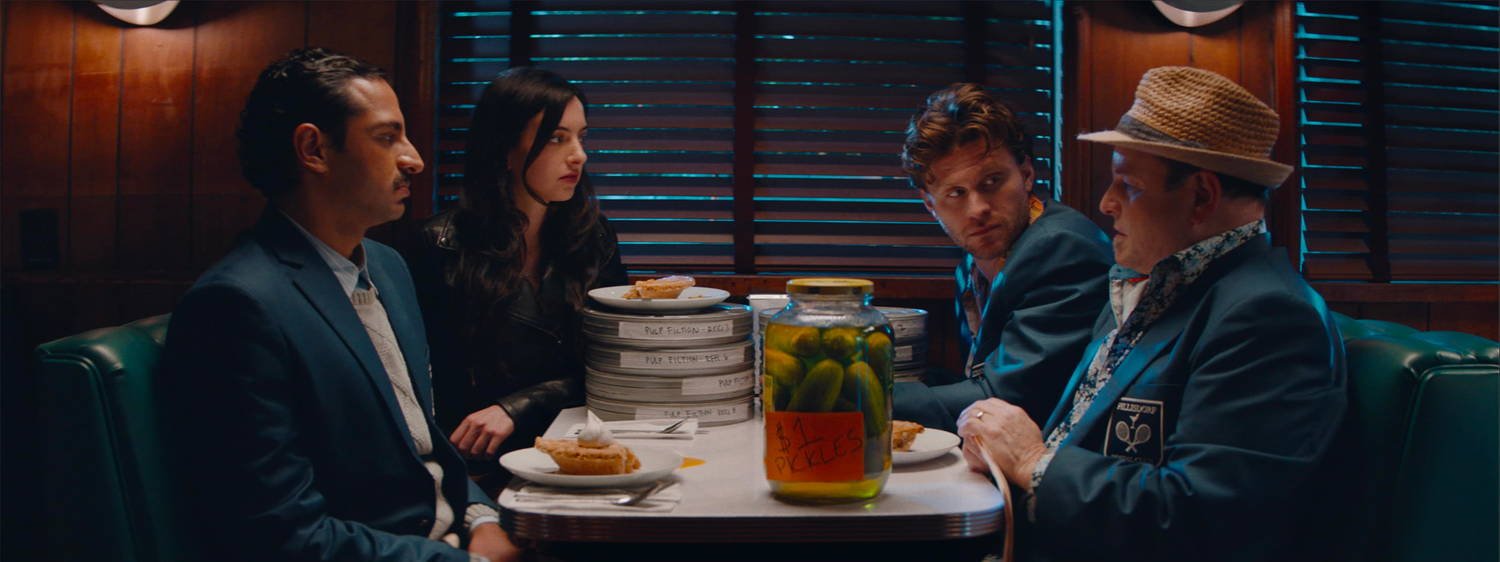STEALING PULP FICTION— 2 STARS
In Stealing Pulp Fiction, our two protagonist best friends frequent a Los Angeles theater owned by Quentin Tarantino, modeled after the actual Beverly Cinema. In the lobby, the place is selling a particularly loud, white t-shirt for $25 that says “I Love Movies,” only the word “movies” is crossed out and replaced underneath by “films.” It’s worn proudly by the staff, like a public service announcement presented as a fashion statement. Later in Stealing Pulp Fiction, after, in essence, a week goes by, the theater doubles the strike-through font with an updated t-shirt marking out “films” for the word “cinema,” while humorously still selling the previous shirts at a discounted price.
LESSON #1: GETTING THE KNOWING JOKES— If you understand the dismissive rub attempted by the types of cinephiles who over-stress those very fickle naming differences and can snicker at the pretentiousness, then you are the crowd that might get Stealing Pulp Fiction. However, if you are one of those stuffy people drawing those strict lines in the semantic sand, you might have to look elsewhere. Written and directed by Danny Turkiewicz, making his feature-length debut, Stealing Pulp Fiction expands on his original 2020 short film of the same name. This cheeky homage tries to be a departure from the usual tributes given to the titular masterpiece movie in question.
Those best friends of Stealing Pulp Fiction are the loquacious Jonathan, played by comedian and former Saturday Night Live cast member Jon Rudnitsky, and the demure Steve, played by Deadpool buddy Karan Soni. The two meet up to share a midnight screening of Pulp Fiction and talk about potential pun-themed businesses. Jonathan is an idea man, constantly looking for a new compass bearing for his life’s path. The meek Steve seems content with attention and being along for the ride.
While it’s certainly not their first viewing of Quentin Tarantino’s film, Jonathan and Steve are rhapsodized. They get news from the theater host (Oliver Cooper of Project X and Californication) that the next Pulp Fiction showing will screen from Tarantino’s personal 35mm print from his collection. In his euphoric state of cinematic bliss, Jonathan gets the eccentric bug in his brain to steal and ransom the 35mm reels. Decompressing afterward for a bite to eat at their favorite haunt, the Brite Spot diner on Sunset Boulevard near Echo and Elysian Parks, the light bulb moment continues, and a plan is loosely hatched.
LESSON #2: HOW MUCH DO YOU LOVE A MOVIE?— This cockamamie scheme in Stealing Pulp Fiction points to rabid fandom that exists at many levels. How much do you love a movie? Enough to commit a crime or two? On one extreme, Quentin Tarantino’s 1994 masterpiece is commonly a starter kit cornerstone of the Film Bro crowd, those who flaunt a limited knowledge and single-mindedness towards dark-and-gritty male-centered cinema. Orienting Jonathan and Steve as a couple of Film Bros would be effortless, but internet rhetoric and those aforementioned t-shirts are normally the types of prizes Film Bros seek. Theft is a step too far, even for their reckless idiocy.
Instead, Jonathan and Steve are lighter, sillier, and different than a Film Bro stereotype, and Turkiewicz draws that out. What they’re really after is a conquest of victory and confidence that will bring them closer to gaining the romantic attention from the mutual women they are pining for. Jonathan has his breath taken away by Rachel (model-actress Taylor Hill of Babylon and The Neon Demon), a fellow patient of local therapist Dr. Mendelbaum (an out-of-nowhere Jason Alexander), and cannot muster a courageous way to ask her out. Likewise, Steve is smitten by the no-nonsense and independent Elizabeth (Cazzie David, seen recently in Adult Best Friends), someone completely opposite to his personality and attitude, whom he wants to present to his friends at the fictional, jacketed members-only Pillisdorf Social Club.
To get closer to both, our guys enlist the brash Elizabeth as a planning partner for a piece of the monetary score and Dr. Mendelbaum as the wheel man in exchange for cash and information about Rachel. After many back-and-forths and mini-arguments of confounding wisdom, everyone is ready for the big night. Prospects are great until Quentin Tarantino (played with outlandish caricature makeup by unknown actor Seager Tennis) shows up to attend the big screening himself.
Jolted by the presence of greatness, everything that could go wrong does for our criminal quartet in Stealing Pulp Fiction. That comedic tailspin rings true to a movie worshipping the work of Quentin Tarantino. So many of his films feature cool cats of kitschy pop culture stylishness who also carry enormous personal fuck-up vices and tendencies that normally lead to their eventual undoing. Even with those negative fates, many people want to live in those created worlds or even be several of Quentin’s irrascible character types.
Homage was clearly the goal of Danny Turkiewicz with Stealing Pulp Fiction. Matching Tarantino, our two leads of Rudnitsky and Soni are a mismatched pair of buddies with loser exteriors and ambitious interiors with their own acronym-filled lingo and hangout vibe. Jonathan and Steve are a pair classic QT chatty Cathys who incessantly talk and finish each other’s sentence. Choosing some easy traits to match, the movie is edited into several titled chapter sections, includes similar musical cues, and emulates some of the framing and slow-motion camera moves of Quentin’s motifs and techniques.
LESSON #3: WHEN YOU LOSE THE HOMAGE— Genuflecting to a generational great like Quentin Tarantino is all well and good until you are Icarus flying too close to the Sun or you become high on your own supply. You lose the homage when the characters and the narrative cannot seem to finish the commitment to the bit. Don’t get me wrong. Quentin Tarantino likes to wander, dilly-dally, and take his time to reach each of his movie’s climaxes and denouements, but he almost always sharply snaps the rope and reaches a pronounced resolution. Stealing Pulp Fiction unravels too errantly and quickly to make it to a solid ending, making this comedic experiment more foolhardy than fun. Nothing is disrespectful, per se. It’s just incomplete.
LOGO DESIGNED BY MEENTS ILLUSTRATED (#1317)



